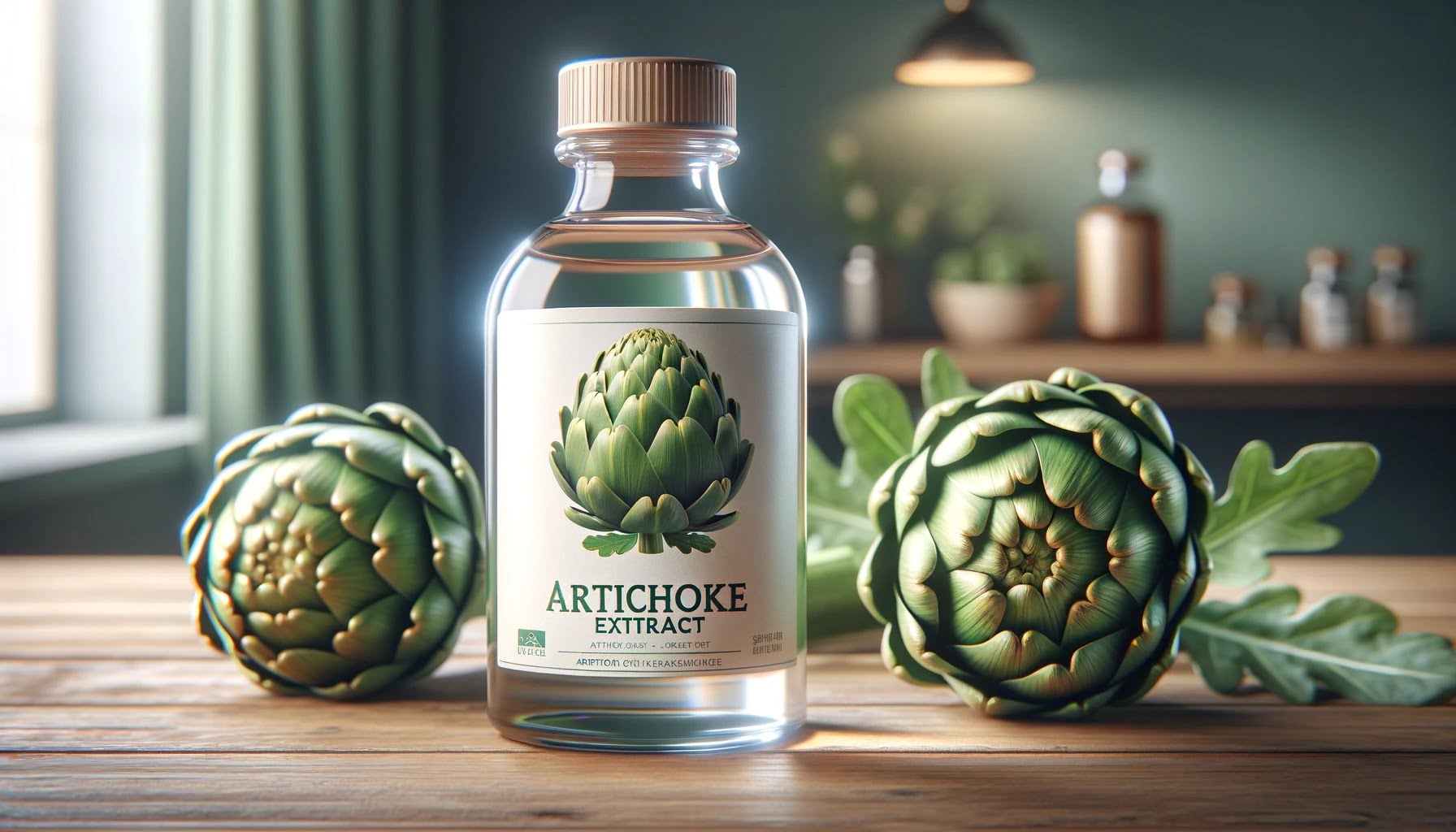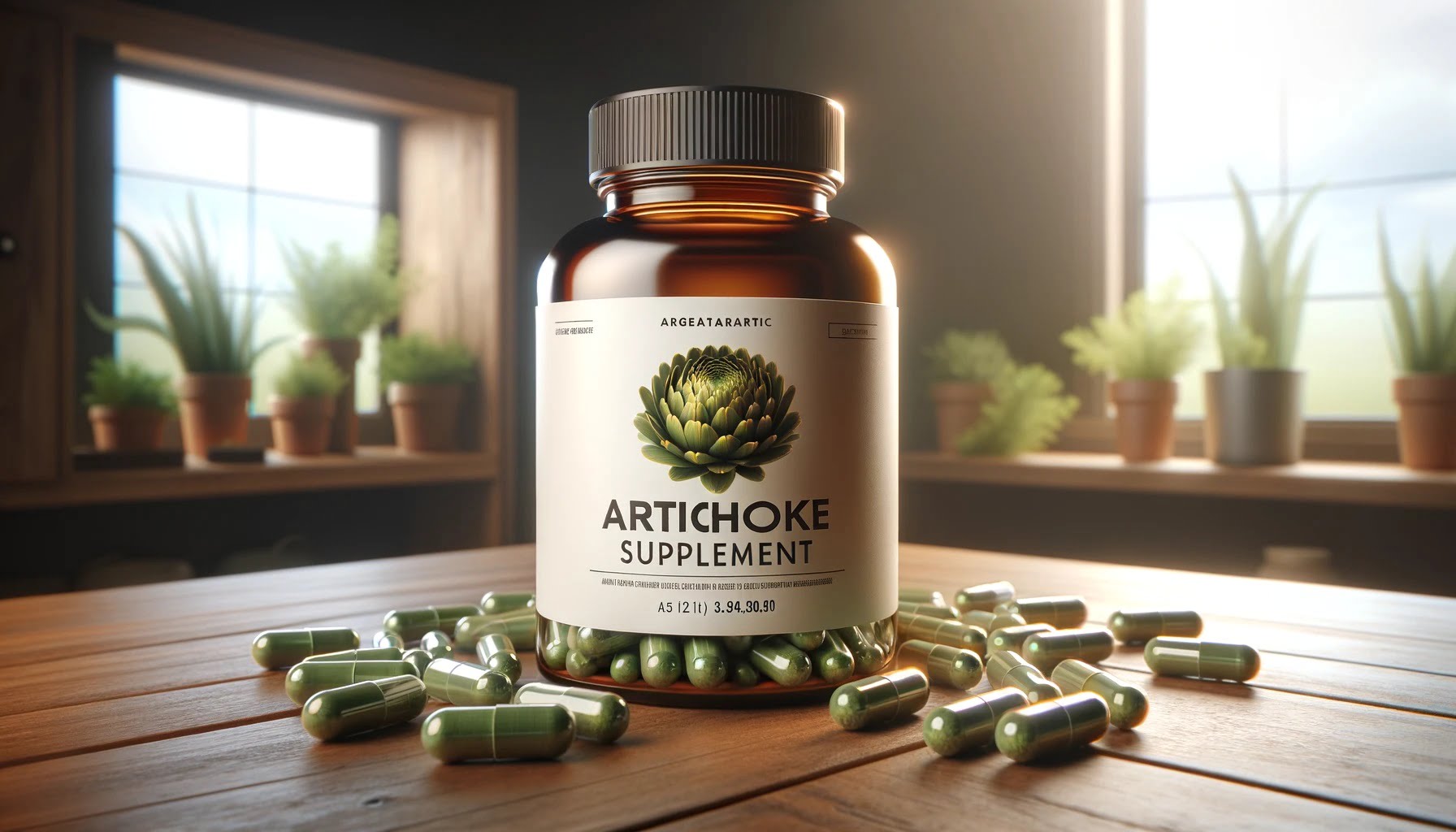
Artichoke extract, derived from Cynara scolymus leaves, is a potent supplement rich in luteolin, cynarin, and silymarin. These compounds offer cognitive, liver, and digestive benefits.
Research suggests artichoke extract can improve memory, prevent age-related cognitive decline, and help in preventing or treating neurodegenerative disorders.
While generally safe, it may cause mild side effects in some users. Dosage typically ranges from 300-1800 mg daily, but individual needs vary.
Table of Contents
What is Artichoke Extract?
Artichoke extract is derived from the leaves of the artichoke plant, Cynara scolymus, a type of thistle native to the Mediterranean region. This extract is rich in bioactive compounds which are prized for their antioxidant and anti-inflammatory properties.
It’s been used for centuries to support cognitive functions as well as overall bodily health. In traditional medicine, artichoke leaf preparations were also used to alleviate symptoms of dyspepsia, bloating, and nausea.
Artichoke extract supplementation supports the maintenance of neuronal health and function, thereby promoting cognitive resilience and performance.
What Are the Key Bioactive Compounds in Artichoke Extract?
Artichoke extract is rich in several key bioactive compounds, including;
- Luteolin
- Cynarin
- Silymarin
These compounds are known for their health-promoting properties, especially in terms of liver health, cholesterol management, and cognitive function.
How Does Luteolin Support Cognitive and General Health?
Luteolin is a flavonoid found abundantly in artichokes. It exhibits strong anti-inflammatory and antioxidant properties, making it beneficial in the prevention and management of various inflammatory conditions.
In the context of brain health, luteolin can inhibit inflammatory pathways in the brain.(1)
Furthermore, its antioxidant action can protect neurons from oxidative stress, potentially reducing the impact of aging on cognitive functions and lowering the risk of neurodegenerative diseases.
What Is Cynarin and How Does It Affect the Body?
Cynarin is a phenolic acid primarily responsible for bile production-enhancing. By stimulating bile secretion, cynarin aids in the digestion and absorption of fats and fat-soluble vitamins, which is crucial for maintaining optimal digestive health.(2)
Additionally, increased bile production helps in the natural detoxification processes of the liver and facilitates the excretion of cholesterol, thus lowering blood cholesterol levels.
What Are the Benefits of Silymarin in Artichoke Extract?
Silymarin is a group of flavonolignans that are often lauded for their liver-protective properties. It supports liver health by promoting liver cell regeneration, protecting liver cells from damage due to toxins, and having anti-fibrotic properties, which can prevent excessive tissue scarring.(3)
Silymarin’s antioxidant capabilities also contribute to its overall protective effects, helping to stabilize cell membranes and combat oxidative stress.
What Are the Health Benefits of Artichoke Extract?

Artichoke extract offers a range of potential health benefits, primarily due to its antioxidant, anti-inflammatory, and cholesterol-lowering properties. It’s been studied for its effects on brain health, cognitive function, digestive health, and cardiovascular well-being.
Does Artichoke Extract Have Nootropic Effects?
Artichoke extract does have nootropic effects, contributing to improved cognitive function and memory. While more research is needed, some studies suggest that the extract’s antioxidant and anti-inflammatory properties support brain health and cognitive performance.
How Does Artichoke Contribute to Improved Memory?
Artichoke extract’s potential memory-enhancing effects may be attributed to its ability to protect brain cells from oxidative stress and inflammation. One study found that a combination of artichoke extract and forskolin improved memory performance in older adults with mild cognitive impairment.(4)
Can Artichoke Help Prevent Age-Related Cognitive Decline?
The antioxidant and anti-inflammatory properties of artichoke extract may help prevent or slow down age-related cognitive decline. By protecting brain cells from damage caused by free radicals and inflammation, the extract may support cognitive function in older adults.(5)
Are There Neuroprotective Effects of Artichoke?
Artichoke extract may offer neuroprotective effects, primarily due to its antioxidant and anti-inflammatory properties. The bioactive compounds in the extract help shield brain cells from oxidative stress and inflammation, which are major contributors to neurodegenerative diseases like Alzheimer’s and Parkinson’s.
Studies suggest that artichoke extract may have potential in preventing or treating neurodegenerative disorders.(6)
Does Artichoke Extract Have Uses Other Than Cognitive Enhancement?
Yes, artichoke extract has several potential uses beyond cognitive enhancement, including supporting healthy cholesterol levels and promoting digestive health.
How Can Artichoke Extract Support Healthy Cholesterol Levels?
Artichoke extract has been shown to support healthy cholesterol levels by reducing total cholesterol and LDL (low-density lipoprotein) cholesterol.
According to a meta-analysis, artichoke leaf extract significantly lowered total cholesterol and LDL cholesterol levels in individuals with hypercholesterolemia.(7)
What Are the Digestive Health Benefits of Artichoke Extract?
Artichoke extract has been traditionally used to support digestive health and alleviate symptoms of dyspepsia, such as bloating, nausea, and abdominal discomfort. The extract’s bitter compounds, including cynarin, stimulate bile flow and promote digestive enzyme secretion, aiding in the digestion process.(8)
How is Artichoke Extract Consumed as a Dietary Supplement?

Artichoke extract is available in various dietary supplement forms, including powders, capsules, and tablets. It can also be consumed as tea or incorporated into beverages and functional foods.
What Are Typical Dosage Recommendations for Artichoke Extract Supplements?
The recommended daily dosage for artichoke extract supplements varies depending on the specific product and its cynarin content. Generally, doses range from 300 – 1800 mg per day, divided into multiple doses.
It’s essential to follow the manufacturer’s instructions or consult with a healthcare professional for personalized dosage recommendations.
Are There Any Safety Concerns or Side Effects with Artichoke Extract?
Artichoke extract is generally considered safe when consumed in recommended doses. However, as with any dietary supplement, it’s essential to be aware of potential side effects and interactions.
What Are the Potential Side Effects of Artichoke Extract?
Artichoke extract is generally safe and well-tolerated, but some side effects may occur, especially at high doses. Here are the potential side effects:
- Gastrointestinal Discomfort: This can include symptoms like bloating and flatulence.
- Allergic Reactions: Although rare, individuals who are sensitive to the Asteraceae family, which includes artichokes, may experience allergic reactions.
Who Should Avoid or Use Caution with Artichoke Extract?
While artichoke extract is generally safe, certain individuals should avoid or use caution when considering its use:
- Pregnant and breastfeeding women, due to limited safety data
- Individuals with gallstones or bile duct obstruction, as the extract may stimulate bile flow
- People with allergies to plants in the Asteraceae family (e.g., ragweed, daisies, chrysanthemums)
- Those taking medications metabolized by the liver or affecting cholesterol levels
It’s always best to consult with a healthcare professional before starting any new dietary supplement, including artichoke extract, to ensure safety and appropriateness for your individual needs.
- Lin, Yong, et al. “Luteolin, a flavonoid with potential for cancer prevention and therapy.” Current cancer drug targets 8.7 (2008): 634-646.↩
- Topal, Meryem, et al. “Antioxidant, antiradical, and anticholinergic properties of cynarin purified from the Illyrian thistle (Onopordum illyricum L.).” Journal of enzyme inhibition and medicinal chemistry 31.2 (2016): 266-275.↩
- Saller, Reinhard, Remy Meier, and Reto Brignoli. “The use of silymarin in the treatment of liver diseases.” Drugs 61 (2001): 2035-2063.↩
- Pittler, Max H., et al. “Effectiveness of artichoke extract in preventing alcohol-induced hangovers: a randomized controlled trial.” CMAJ 169.12 (2003): 1269-1273.↩
- Szewczyk, Aleksandra, et al. “The effect of a diet enriched with Jerusalem artichoke, inulin, and fluoxetine on cognitive functions, neurogenesis, and the composition of the intestinal microbiota in mice.” Current Issues in Molecular Biology 45.3 (2023): 2561-2579.↩
- Iglesias-Carres, Lisard, et al. “In vitro evidences of the globe artichoke antioxidant, cardioprotective and neuroprotective effects.” Journal of Functional Foods 107 (2023): 105674.↩
- Bundy, Rafe, et al. “Artichoke leaf extract (Cynara scolymus) reduces plasma cholesterol in otherwise healthy hypercholesterolemic adults: a randomized, double blind placebo controlled trial.” Phytomedicine 15.9 (2008): 668-675.↩
- Garbetta, Antonella, et al. “Antioxidant activity induced by main polyphenols present in edible artichoke heads: Influence of in vitro gastro-intestinal digestion.” Journal of Functional Foods 10 (2014): 456-464.↩
